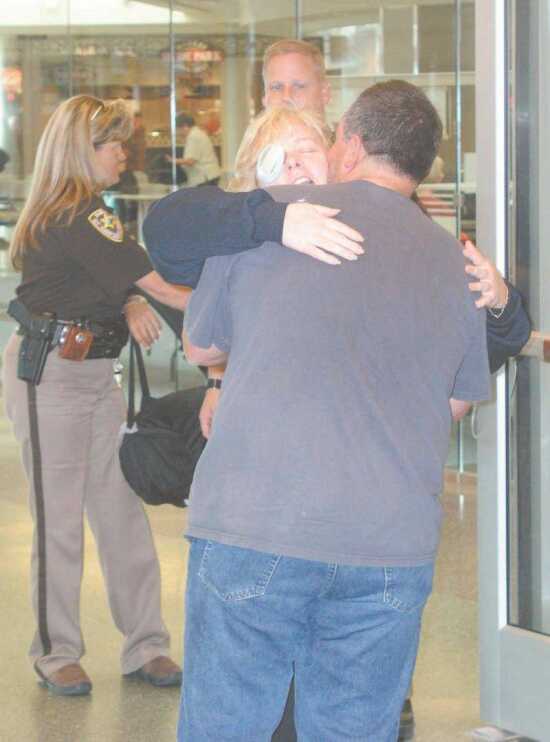Woman injured in Baghdad blast comes home

She came home battered and bruised, but bearing a beautific smile, as family and friends held up banners and balloons at the Boise Airport last week.
On Wednesday, Sara Latona, the AAFES employee on base who was injured in a bombing attack in Iraq, walked through the Boise Airport terminal under her own power and into the arms of her husband, Carl.
A large patch covered her eye, which had been injured by shrapnel from the roadside bomb that detonated alongside the vehicle she had been driving. That eye will require further surgery, but she believes her sight will be restored.
After a few minutes of well-wishing from friends at the AAFES facility on base who had shown up to welcome her home, fatigue began to set in and she sat down in a wheelchair while Boise media hovered around her for interviews.
"I'm OK," she told the Mountain Home News in a separate interview Monday. "I could be better, but I'm cool."
Latona had served eight years in the Air Force, then became a civilian employee of AAFES nine years ago.
She had volunteered to serve with the AAFES services in Iraq when the war first broke out.
"We're sort of like a general store" for the troops, she explained. "The troops need us. We're a piece of home, something that reminds them what they're fighting for. For the troops, we're like the ice cream on the apple pie.
"We're there to support them" she said. "And they don't just go in to purchase things, a lot of them just come in to visit, to talk with some civilians from back home. We become their surrogate moms."
She said anything the troops get that reminds them of home is important. "The care packages they get, the banners from schools with little hand prints, it makes a big difference to them."
It wasn't the money that sent her. "I felt it was my duty."
She did an 18-month tour working out of Kuwait, then returned home this June. "But in my eyes, I really didn't finish the job."
So she sat down with her family and talked to them about going back. "My son told me I could have six more months, but that was it. He said, 'you can go see your kids over there, then come back and stay.' Well, it ended up only two weeks."
On Oct. 9, Latona was doing her job, driving a bus and serving as a courier between Kuwait and Baghdad, delivering supplies and mail, and picking up mail to be taken to Kuwait and sent home. She had three military members aboard that she was going to drop off along the convoy route at fuel resupply dumps where they worked.
Part of a night convoy ("they thought that would be safer"), she was about 30 minutes out of Baghdad International Airport on the way to Kuwait, when, at about 9:30 p.m. Iraq time, her world changed dramatically.
A series of roadside bombs suddenly went off, damaging her bus and several vehicles behind her. "They went off like a daisy chain," she said. "It was kind of like, 'wow.' It was very surreal. It was like a flash bulb had gone off, and then there was glass all over. I just stepped on the gas.
"The kid next to me took a lot of the blast," which had occured under the bus on the passenger side. "He was really hurt. His legs looked like boiled lobster. Another sergeant (in the bus) had a shattered knee."
She was covered in blood, some of it from the young man who had been sitting near her, and some of it her own. Her adrenaline had kicked in and at first she didn't realize she also had been injured. "I didn't even realize my eye had been hurt. I thought I was just covered in that poor young kid's blood."
She drove the bus "about 250 meters, then the transmission gave out. The MPs got us out and the soldiers (guarding the convoy) moved around us quickly to protect us."
Medics worked on her while they waited for the helicopters to evacuated the wounded, which quickly arrived. She'd taken shrapnel in her rear end, hips, side, arm, face and eye.
She was flown to Germany for initial surgical treatment, where doctors removed many of the pieces of shrapnel, including one that was "about two inches long and about an inch and a half wide from my heiney. It just got meat," she laughed, although it's made sitting down a little uncomfortable, she noted.
After doctors in Germany evaluated her eye, they immediately flew her to Walter Reed Hospital for further evaluation.
"Everybody at the (military) hospitals kept saying that I was the first civilian they'd seen go through," although she was aware a couple of other AAFES employees had suffered minor wounds during their volunteer tours in the war zone.
Latona said the doctors want to wait until all the swelling goes down before doing any surgery, but expect she'll need a cornea transplant. "They're optimistic about me seeing them again."
Shrapnel slivers continue to migrate out of her arm, which still has "a tingling feeling" in it, and she still tires easily, but she's looking forward to returning to work as soon as she can.
But as much as she believes volunteers are needed to support the troops in Iraq, this was her last tour. "I don't think my family is going to let me go back again. I think the answer to that question is a big NO!."
